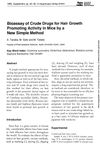 August 2023 in “Skin Research and Technology”
August 2023 in “Skin Research and Technology” BLH308, with persimmon leaf, green tea, and sophora fruit extracts, safely increased hair density and thickness.
 2 citations,
August 2022 in “Korean journal of medicinal crop science/Han-gug yagyong jagmul hag-hoeji”
2 citations,
August 2022 in “Korean journal of medicinal crop science/Han-gug yagyong jagmul hag-hoeji” BLH308, made from persimmon leaf, green tea, and sophora fruit, may help reduce hair loss by fighting oxidative stress and inflammation.
[object Object] May 2024 in “Molecules/Molecules online/Molecules annual” Plant extracts can help prevent hair loss and promote hair growth.
 June 2024 in “Korean Journal of Pharmacognosy”
June 2024 in “Korean Journal of Pharmacognosy” The compound from Rhododendron mucronulatum roots may help treat male pattern hair loss.
 February 2023 in “Han'gug miyong haghoeji/Journal of the Korean society of cosmetology”
February 2023 in “Han'gug miyong haghoeji/Journal of the Korean society of cosmetology” Aroma essential oils in shampoo may help prevent hair loss and promote hair growth.
 1 citations,
September 2022 in “Evidence-based Complementary and Alternative Medicine”
1 citations,
September 2022 in “Evidence-based Complementary and Alternative Medicine” Gardenia florida fruit extract may help hair grow and needs more research to understand how.
 11 citations,
September 2020 in “Journal of Cosmetic Dermatology”
11 citations,
September 2020 in “Journal of Cosmetic Dermatology” Silver nanoparticles can significantly promote hair growth.
 14 citations,
April 2021 in “Heliyon”
14 citations,
April 2021 in “Heliyon” Pomegranate leaf extract may help with hair growth, dandruff, and lice.
 8 citations,
June 2022 in “Cosmetics”
8 citations,
June 2022 in “Cosmetics” Coffee berry extract may help slow skin aging and prevent hair loss.
 41 citations,
July 2015 in “Current Drug Discovery Technologies”
41 citations,
July 2015 in “Current Drug Discovery Technologies” Some plants may help with hair growth and have fewer side effects than synthetic drugs, but more research is needed to confirm their effectiveness.
1 citations,
April 2022 in “Journal of Ayurveda and integrative medicine” Blumea eriantha DC extract shows strong potential for promoting hair growth.
[object Object]  39 citations,
June 2017 in “Journal of Applied Research on Medicinal and Aromatic Plants”
39 citations,
June 2017 in “Journal of Applied Research on Medicinal and Aromatic Plants” Plant-based ingredients are effective and safe for modern skincare products.

Nanocarriers with plant extracts show promise for safe and effective hair growth treatment.
 2 citations,
January 2023 in “Pharmaceuticals”
2 citations,
January 2023 in “Pharmaceuticals” Natural products and phytochemicals may help with hair regrowth, but more research is needed.
 76 citations,
August 2018 in “International Journal of Cosmetic Science”
76 citations,
August 2018 in “International Journal of Cosmetic Science” Dermal Papilla cells are a promising tool for evaluating hair growth treatments.
 170 citations,
September 2019 in “Evidence-based Complementary and Alternative Medicine”
170 citations,
September 2019 in “Evidence-based Complementary and Alternative Medicine” Some medicinal plants can help heal wounds and may lead to new treatments.
 24 citations,
January 2020 in “International Journal of Molecular Sciences”
24 citations,
January 2020 in “International Journal of Molecular Sciences” Some plants with flavonoids may help treat hair loss and promote hair growth.
 1 citations,
January 2017 in “Elsevier eBooks”
1 citations,
January 2017 in “Elsevier eBooks” The document concludes that new treatments for hair loss may involve a combination of cosmetics, clinical methods, and genetic approaches.
 November 2015 in “Pharmacy & pharmacology international journal”
November 2015 in “Pharmacy & pharmacology international journal” Jamun fruit pulp extract is better at promoting hair growth than seed extract.
 16 citations,
January 1980 in “Planta Medica”
16 citations,
January 1980 in “Planta Medica” Some natural extracts and one hair tonic can promote hair growth in mice.
 39 citations,
September 2013 in “Journal of Cosmetic Dermatology”
39 citations,
September 2013 in “Journal of Cosmetic Dermatology” Herbs can potentially treat hair loss by inhibiting a key enzyme and promoting hair growth, and deficiencies in zinc, biotin, and iron are linked to hair loss.
 8 citations,
April 2020 in “Journal of Ethnopharmacology”
8 citations,
April 2020 in “Journal of Ethnopharmacology” Herbs might help with hair loss, but more research is needed to confirm their safety and effectiveness.
 85 citations,
March 2012 in “Revista Brasileira de Farmacognosia”
85 citations,
March 2012 in “Revista Brasileira de Farmacognosia” The genus Sophora has compounds with potential health benefits and could lead to new drugs, but more research is needed to understand their effects and safety.
 125 citations,
December 2016 in “Molecules”
125 citations,
December 2016 in “Molecules” Substances from Chinese medicines show promise for immune support and disease prevention, but the way they are processed affects their effectiveness.
 4 citations,
August 2017 in “Cosmetics”
4 citations,
August 2017 in “Cosmetics” The extract reduced sebum production and promoted hair growth.
 24 citations,
January 2015 in “Annals of Dermatology”
24 citations,
January 2015 in “Annals of Dermatology” Herbal extracts may help hair grow and could be an alternative to synthetic hair loss treatments.
 December 2023 in “International Journal of Science and Research (IJSR)”
December 2023 in “International Journal of Science and Research (IJSR)” Herbal treatments are effective and preferred for hair loss with fewer side effects.
 January 2002 in “Journal of Toxicology-cutaneous and Ocular Toxicology”
January 2002 in “Journal of Toxicology-cutaneous and Ocular Toxicology” Botanical extracts are increasingly important in cosmetics and drugs for their effectiveness and safety, backed by traditional use and scientific evidence.
 6 citations,
March 2014 in “Herba Polonica”
6 citations,
March 2014 in “Herba Polonica” Plant extracts may help treat hormone-related hair loss.
 1 citations,
August 2020 in “Food Research”
1 citations,
August 2020 in “Food Research” Plant extracts like Avicennia marina, Boehmeria nipononivea, and Camellia sinensis could potentially treat hair loss with fewer side effects than synthetic drugs.



























